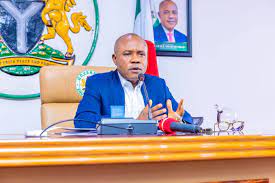By Sadiq Abubakar Maiduguri–
Norwegian Refugee Council (NRC), a humanitarian international organization, said yesterday in Maiduguri that majority of the estimated 1.8 million Internally Displaced Persons (IDPs) in Borno state were scared to return o their communities. NRC Secretary General, Mr. Jan Egeland, said at a press briefi ng that over 60 per cent were unwilling to return as a result of insecurity. He added that the Nigerian military recently gained ground in the fi ght against Boko Haram, but the armed group stepped up attacks on soft targets, including markets and sites sheltering displaced people.
He said the NRC sought the opinion of 27,000 people in the research which it said was one of “the largest pieces of research carried out on the displaced population, adding that, the report observed that many offi cials in Nigeria’s government were keen to see communities move back home. Tagged “Too Scared to Return”, the report stated that fi ndings “are indisputable, but 86 per cent of people told us they aren’t ready to go home yet, we must listen.
This cannot fall on deaf ears. Egeland, warned that “people must decide to return on their own free will as forcing IDPs or communities to return home will be a deadly move and an eff ort to worsen the confl ict”. He said NRC report came at a time dozens of IDPs from Bama local government area, one of the largest communities displaced by Boko Haram, were being held in custody for staging a street protest asking government to allow them return home. “Because an overwhelming 85 per cent of IDPs living in formal camps tell us they feel safer there than where they were before, despite the deplorable attacks on IDPs camps.
“Today I met a woman in Monguno town who fl ed her village two years ago after Boko Haram set it ablaze. She’s eager to bring her six children home, but she told me it’s too soon, that the armed group are still present. “Th e report based on research largely carried out in September this year also stated that some of the IDPs would still insist on remaining in the city even if the Boko Haram insurgents are totally wiped out.” “Even if the security situation improves, half the displaced people interviewed say their houses were destroyed in the confl ict.
“About 48 per cent of people interviewed do not have information about the current state of their homes, indicating that this fi gure could be much higher,” Egeland added. About 80 per cent of IDPs are in Borno state, with over half living outside of camps in local communities. Some 220,000 people have fl ed to Cameroon, Niger and Chad; while 5.2 million people are food insecure in North-east Nigeria. “An estimated 450,000 children are suff ering from severe malnutrition, while 20,000 people have been killed since the start of the confl ict 8 years ago. Over 4,100 cases of suspected cholera and 56 deaths have been reported.
Th e report added that at least 57 per cent of schools in Borno state are still closed due to confl ict. “Th e challenge of managing the humanitarian confl ict is still enormous because the $1 billion 2017 global aid appeal for Nigeria is only funded by 64 per cent”, the report added.



